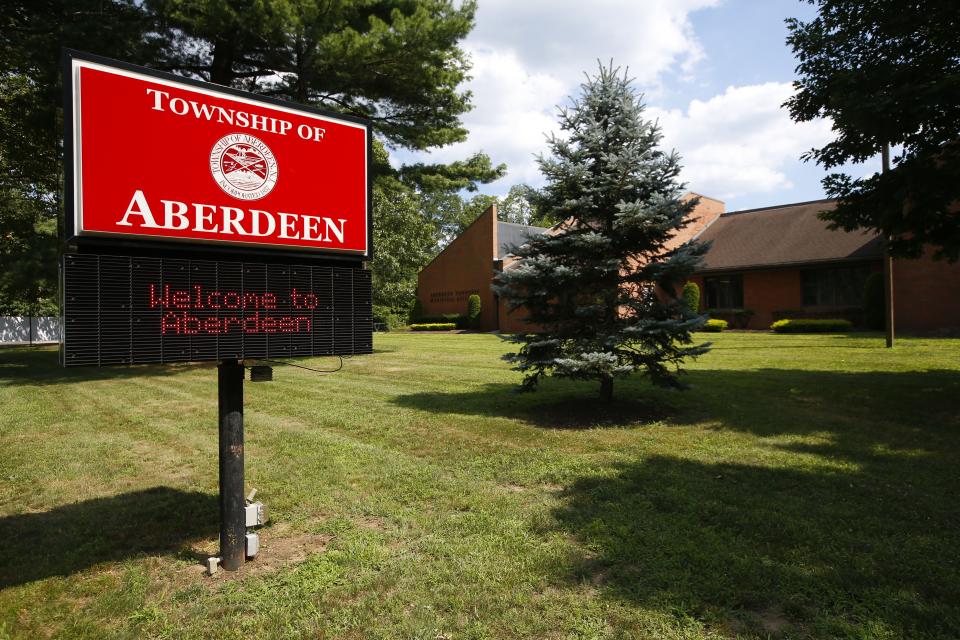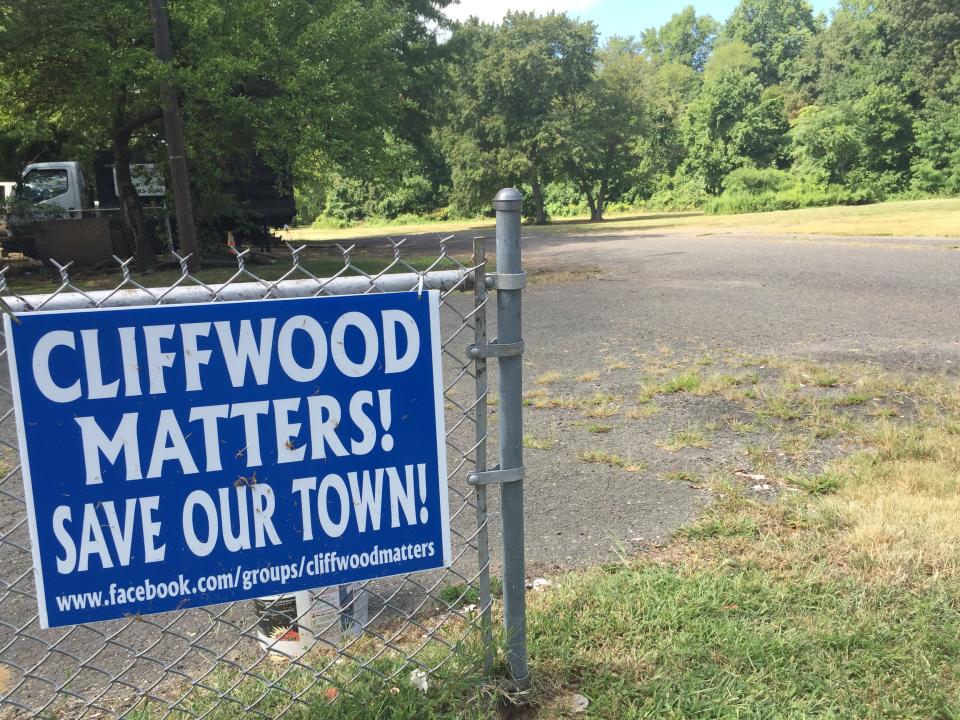Could zoning change let Aberdeen yeshiva fill up 2 blocks? Cliffwood Beach neighbors worry
Four years ago, Mark Bishop bought a house on Center Street in the Cliffwood Beach section of Aberdeen because it was a quiet, dead-end road — ideal for raising kids.
Ten days ago, a notice in the mail made him wonder if that’s about to change.
The letter, sent by Aberdeen’s municipal clerk, informed him of a proposed ordinance that will be discussed and voted upon at Thursday’s Township Council meeting. It would a create an “INS institutional overlay” zoning district on a two-block residential area that encompasses Bishop’s home and several dozen others.
The purpose of the overlay is to allow the allow Yeshiva Gedolah of Cliffwood — a rabbinical college at the end of Center Street — to “go up to 55 feet, which would be one more story on their building,” according to John Francis Roman, Aberdeen’s public information officer.
Another growing yeshiva: Lakewood's Beth Medrash Govoha yeshiva to add 600 apartments for students, staff
Bishop and some of his neighbors are not convinced that adding one floor is the sole purpose.

“If they just want to renovate the school and there’s no broader redevelopment plan, why is the zone so large?” he said.
There is a backstory that sheds light on his concern.
Repairing the roads: Which Monmouth and Ocean bridges need to be fixed? These 24 are on the list
Meinzer Street controversy

A few blocks west of Center Street lies Meinzer Street, a similarly quiet residential block. In 2017 residents there fought back against a proposal to build an Orthodox Jewish academy run by religious nonprofit Ruach Chaim Inc. (which also owns Yeshiva Gedolah, which opened in 2005 on Center Street).
The proposed academy consisted of a synagogue/educational center/cafeteria, a gymnasium/recreational center, a 160-bed student dormitory and a 42-unit married-student apartment building. It never moved forward amid intense citizen opposition.
“There was a negotiation between the township council and Rabbi (Shimon) Alster, for Rabbi Alster to withdraw the application for Meinzer Street and we would change the zoning to where the yeshiva currently sits (to allow an extra story and more students, up to 100)," Aberdeen council member Greg Cannon said. "Fundamentally the negotiation was, ‘Rabbi, this Meinzer Street project is clearly going to incur a lawsuit by residents, so it’s going to be years and expensive. What if we gave you the ability to improve the current building that you’re in?'”
Lakewood fight: Yeshiva pulls plans for controversial 52-unit Lakewood housing complex
It took seven years for Ruach Chaim Inc. to sell its Meinzer Street property, Cannon said, clearing the way for the back end of the deal to be executed.
As to why this overlay encompasses two blocks, Cannon said, “You can’t just do it for one lot; then it’s called spot-zoning. And its parking lot is on another block, so the yeshiva has property on two blocks.”
Cliffwood Beach was a top Shore resort: Now see its remains hiding in the woods
'It doesn't make sense'
Ruach Chaim Inc. owns several other properties right around Yeshiva Gedolah, which gives residents pause about what might happen down the road.
“When you see them plotted out and you see the size of the property they want rezoned, it doesn’t make sense that they just want to renovate this one building,” Bishop said. “There’s obviously going to be a broader development plan down the road that they’re not admitting to yet.”
Bishop delivered a letter to town officials expressing concern that with such a plan, “a decrease in tax revenue could have far-reaching consequences, particularly for essential services such as education." Nonprofit schools, both public and private, such as the yeshiva, are exempt from paying property taxes in New Jersey.
The letter also asks that Thursday’s vote be postponed.
“This is a small, dead-end residential block,” Bishop said. “I’ve got a 17-month old. It’s a nice, quiet area, there are not too many cars going down the street. That’s why we bought here. The whole neighborhood is upset about this.”
Township manager Bryan Russell said he understands residents’ concerns, but said the overlay “doesn’t replace the existing zoning rules. A single-family home within the overlay, they continue the right to maintain the property as they always have.”
Growing Orthodox community: How a 'sleeping giant' grabbed political power in Jackson
Tiffany Stevenson, a 15-year resident of the neighborhood and mother of three schoolchildren, said she will attend Thursday’s council meeting to air her concerns and encourages her neighbors to do the same.
“I understand it’s spring break for many of us and it’s unfortunate that they’re planning this (vote) for this time, but this is going to affect us forever,” Stevenson said. “It’s important to take a few minutes out of your spring break to come and make sure we keep our community the way it is.”
The proposed ordinance also has the attention of members of the Matawan-Aberdeen Regional School District; several board of education members will be attending Thursday’s council meeting.
“The board is aware of the proposed rezoning and its potential impact on taxable property in town,” board president Dianna Pell said in a statement. “We are learning along with the community about the details of this proposal and will continue to monitor the issue."
Asked about potential educational repercussions, Cannon replied, “This is an adult school. That is not changing. All of the concerns from Ocean County about school districts and resources is not applicable here.”
Uncertain future
Cannon said a happy medium must be found.
“I read the newspaper about what’s happened in Jackson and Toms River — you can go down the list where people were seeking to exclude Jewish groups from town and the billions of dollars in (legal) judgments that they paid,” he said.
Jackson was sued for antisemitism. At settlement meeting, residents blame Orthodox Jews
“Aberdeen’s population, about 15% of it, is Jewish, so this is a welcoming community for Jewish people. And a far better approach in our view, instead of fighting lawsuits, is going and talking to your neighbor and saying, ‘Can you fix up your current building rather than building a six-acre campus that’s going to get us into a whole bunch of lawsuits?’ So that was the arrangement that we came to.”
As to what might happen along Center Street in the future, Cannon could not forecast.
“At this point there is no development application or any land-use application they’ve put in,” he said. “I don’t know when they’re going to do it. That was not part of the application.”
Pointing to the rising property values in town, he added, “I do think that significantly limits what they could do in general in the neighborhood. The lot size you have to assemble to build another educational facility (according to the ordinance, 20,000 square feet) is pretty much the whole block. I don’t know what will happen in the future.”
Jerry Carino is community columnist for the Asbury Park Press, focusing on the Jersey Shore’s interesting people, inspiring stories and pressing issues. Contact him at jcarino@gannettnj.com.
This article originally appeared on Asbury Park Press: Aberdeen yeshiva growth? Cliffwood Beach neighbors fear zoning change

